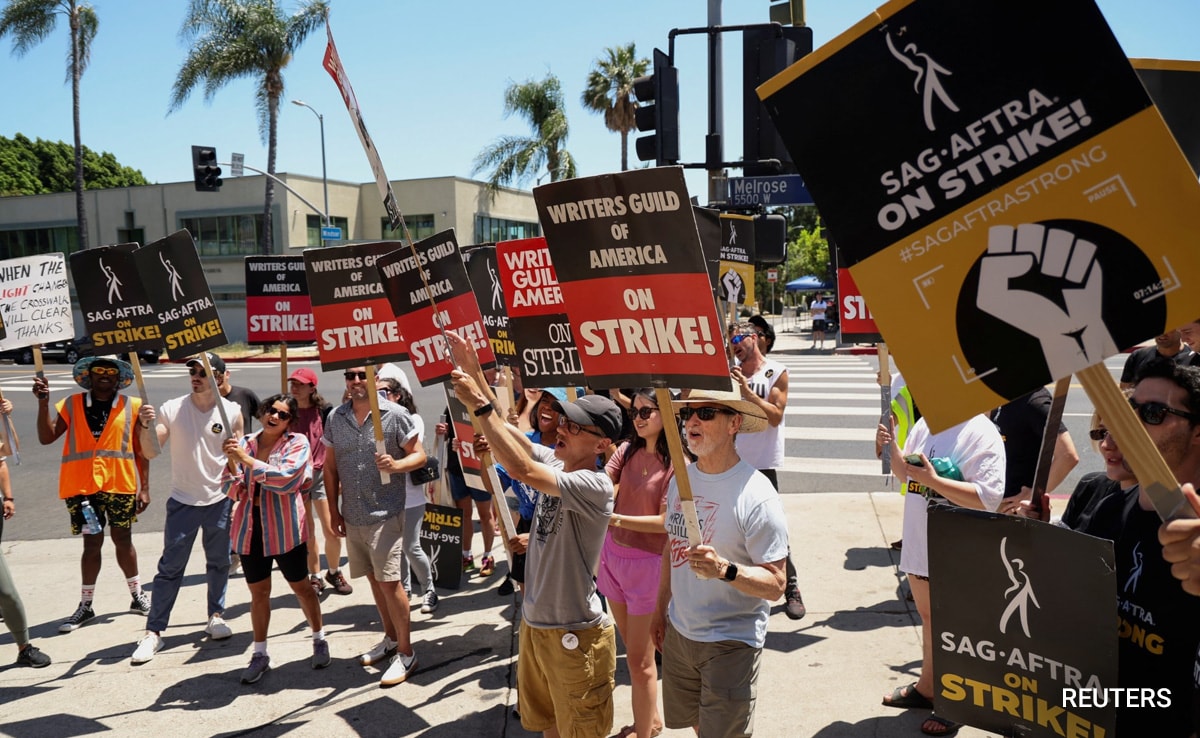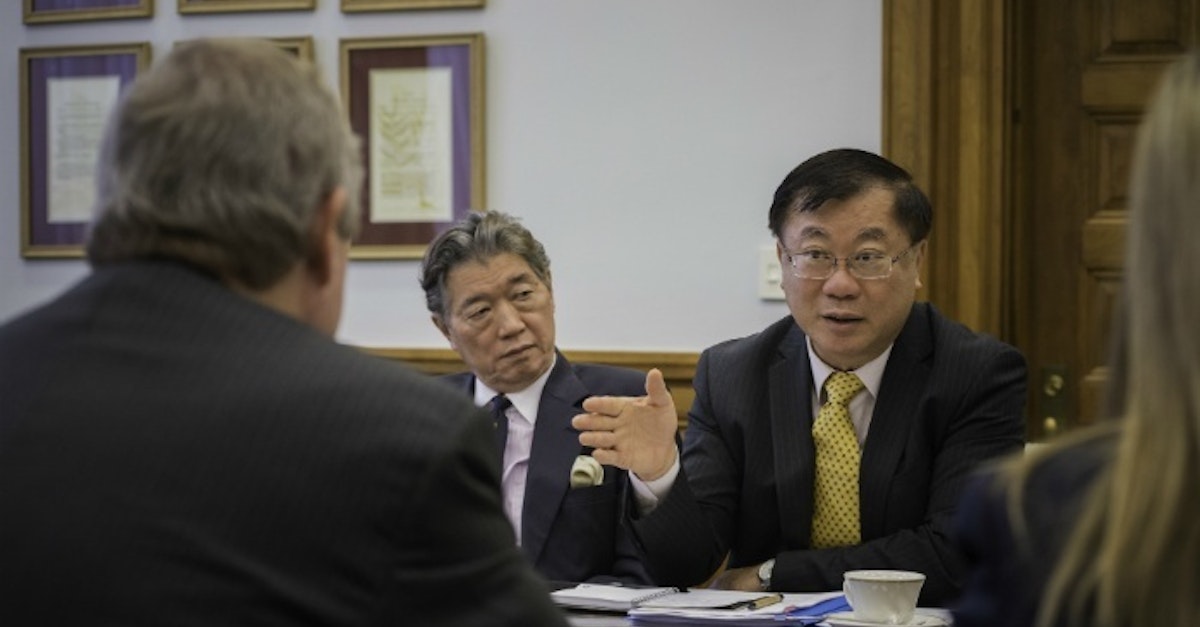Hollywood Strike: Actors Join Writers, Bringing Production To A Standstill

Table of Contents
SAG-AFTRA Joins the WGA on the Picket Line
SAG-AFTRA's decision to join the WGA on the picket line marks a significant escalation of the ongoing labor dispute. This unified front, combining the power of both writers and actors, creates an unprecedented level of disruption within the entertainment industry. The overlap between the two strikes amplifies their collective bargaining power and strengthens their demands against the Alliance of Motion Picture and Television Producers (AMPTP).
-
Key demands of SAG-AFTRA: SAG-AFTRA's key demands mirror many of the WGA's, focusing on fair wages, particularly concerning streaming residuals. Actors are demanding a larger share of the profits generated from streaming platforms, reflecting the significant shift in how content is consumed and distributed. Furthermore, they are seeking strong protections against the misuse of AI in the creation and distribution of performances.
-
Solidarity with the WGA: The combined strength of the WGA and SAG-AFTRA strike creates a powerful force. The solidarity between the two unions highlights the shared concerns over fair compensation and the exploitation of creative labor in the age of streaming. This unified action is expected to put significant pressure on the AMPTP to negotiate seriously.
-
Impact on major productions and release schedules: The Hollywood strike is already having a major impact on numerous high-profile projects. Many film and television productions have been shut down indefinitely, leading to significant delays in release schedules. This disruption will likely affect box office numbers and streaming viewership in the coming months and beyond.
-
Examples of high-profile projects affected: The strike is impacting countless projects, including major studio films, popular television series, and late-night talk shows. The absence of actors and writers has brought many productions to a complete halt, with no clear end in sight. This is a clear demonstration of the widespread impact of this strike.
The Core Issues Fueling the Hollywood Strike
The fundamental disagreements between the unions and the AMPTP stem from several critical issues that have been simmering for years, culminating in this unprecedented joint strike.
-
Fair compensation for streaming work (residuals): The rise of streaming platforms has dramatically altered the landscape of the entertainment industry. Traditional models of compensation, particularly residuals for actors and writers, have not kept pace with the growth of these platforms. This has led to a significant loss of income for many creatives.
-
The use of AI in the creative process and potential job displacement: The increasing use of AI in film and television production raises significant concerns about job security and creative control. Both SAG-AFTRA and the WGA are seeking safeguards to prevent the exploitation of their members' work through AI technologies. Concerns include AI-generated performances replacing actors and AI writing scripts without proper compensation to writers.
-
Concerns about working conditions and exploitation: The unions are also addressing concerns about working conditions and exploitation within the entertainment industry. This includes issues such as long hours, unfair treatment, and a lack of adequate health and safety measures.
-
The power imbalance between studios and creative talent: The Hollywood Strike highlights a fundamental power imbalance between major studios and the creative talent that fuels the industry. The unions argue that studios are leveraging their position to suppress fair compensation and exploit creative workers.
-
Specific examples: Many examples highlight these issues. Actors are concerned about the use of their likeness and performances without adequate compensation in AI-generated projects. Writers are frustrated by the diminishing residuals from streaming platforms compared to traditional broadcast deals.
The Potential Impact of the Hollywood Strike
The prolonged Hollywood Strike will have far-reaching consequences across the entertainment industry and beyond.
-
Economic impact on the entertainment industry and related businesses: The strike is causing significant economic losses for the entertainment industry, impacting businesses that rely on film and television production, including catering services, transportation, and post-production facilities.
-
The effect on upcoming film and television releases: Numerous film and television projects are facing indefinite delays, leading to potential losses for studios and disruption for viewers eager to see their favorite shows and movies.
-
The potential for long-term changes in the industry's labor practices: The strike could lead to significant long-term changes in the industry's labor practices, including new models of compensation and stronger protections for creative workers.
-
The impact on actors and writers' livelihoods: The strike is directly affecting the livelihoods of thousands of actors and writers, who are facing lost income during the work stoppage.
-
Public opinion and support for the striking unions: Public opinion appears to largely support the striking unions, recognizing the importance of fair compensation and protections for creative workers in an evolving entertainment landscape.
Negotiations and Potential Resolutions for the Hollywood Strike
Resolving the Hollywood Strike will require significant concessions from both the AMPTP and the unions.
-
The role of the AMPTP in negotiations: The AMPTP plays a crucial role in negotiations, representing major studios and production companies. Their willingness to compromise will be key to reaching a resolution.
-
Potential compromises and concessions from both sides: Both sides will likely need to make concessions to reach a mutually agreeable settlement. This might involve compromises on streaming residuals, AI usage regulations, and minimum pay scales.
-
The timeline for resolving the strike and returning to production: The timeline for resolving the strike remains uncertain, with potential for both short-term and protracted conflicts.
-
Public pressure and the influence of media coverage: Public opinion and media coverage will significantly influence the outcome of the negotiations. Continued public support for the strike could put pressure on the AMPTP to make concessions.
-
The possibility of further escalation or prolonged conflict: The possibility of further escalation or a protracted conflict remains a significant concern, with potential for long-term damage to the entertainment industry.
Conclusion
The Hollywood Strike, encompassing both actors and writers, is a significant event with profound implications for the entertainment industry. The core issues—fair wages, AI usage, and streaming residuals—highlight a critical imbalance of power and the need for fundamental changes in how creative talent is compensated and protected. The duration and ultimate outcome of this strike remain uncertain, but its impact will undoubtedly shape the future of Hollywood for years to come.
Call to Action: Stay informed about the evolving situation surrounding the Hollywood Strike. Follow reputable news sources for updates on negotiations and the ongoing impact of this unprecedented labor dispute on your favorite films and television shows. Understanding the complexities of the Hollywood Strike is vital to appreciating the fight for fair compensation and creative control in the entertainment industry.

Featured Posts
-
 Selling Sunset Star Exposes La Landlord Price Gouging After Fires
Apr 26, 2025
Selling Sunset Star Exposes La Landlord Price Gouging After Fires
Apr 26, 2025 -
 Construction Of The Worlds Tallest Abandoned Skyscraper To Resume
Apr 26, 2025
Construction Of The Worlds Tallest Abandoned Skyscraper To Resume
Apr 26, 2025 -
 Rural School 2700 Miles From Dc Feeling The Impact Of Trumps First 100 Days
Apr 26, 2025
Rural School 2700 Miles From Dc Feeling The Impact Of Trumps First 100 Days
Apr 26, 2025 -
 5 Dos And Don Ts Succeeding In The Private Credit Job Market
Apr 26, 2025
5 Dos And Don Ts Succeeding In The Private Credit Job Market
Apr 26, 2025 -
 American Battleground Confronting The Worlds Richest Man
Apr 26, 2025
American Battleground Confronting The Worlds Richest Man
Apr 26, 2025
